530. Generally
Nothing in legislative history of venue provision of 46 USCS Appx § 688 indicates that its framers meant to use term “residence” as anything more than reference to more general doctrines of venue rules, which might alter in future. Pure Oil Co. v Suarez (1966) 384 US 202, 16 L Ed 2d 474, 86 S Ct 1394.
Although special venue provision of 46 USCS Appx § 688 reads in jurisdictional terms, it refers to venue only; venue provisions of § 688 should receive treatment consistent with liberal application of that legislation. Penrod Drilling Co. v Johnson (1969, CA5 Tex) 414 F2d 1217, cert den 396 US 1003, 24 L Ed 2d 495, 90 S Ct 552.
Venue requirement of 46 USCS Appx § 688 does not dictate only forum in which action may be tried; venue provisions merely confer upon defendant personal privilege which may be waived. Hill v Upper Mississippi Towing Corp. (1956, DC Minn) 141 F Supp 692.
531. Applicability to other actions
Venue provision of 46 USCS Appx § 688 is controlling when combined negligence and unseaworthiness claim is filed as civil action, but is not controlling when same subject matter is incorporated in libel in admiralty. Leith v Oil Transport Co. (1963, CA3 Pa) 321 F2d 591 (disagreed with Pure Oil Co. v Suarez (CA5 Fla) 346 F2d 890, affd 384 US 202, 16 L Ed 2d 474, 86 S Ct 1394).
Venue of common law action must be governed by 46 USCS Appx § 688. Wiss v Booth Fisheries Co. (1929, DC Or) 1929 AMC 1477.
When Jones Act (46 USCS Appx § 688) claim is combined with unseaworthiness allegation, and filed as civil action, venue provisions of § 688 are controlling. White v Waxler Towing Co. (1965, ND Ill) 250 F Supp 320.
532. –Suits in admiralty
Where seaman commences his action by libel in admiralty, but properly claims benefits of 46 USCS Appx § 688 in connection therewith, he is not required to follow venue provisions of 46 USCS Appx § 688. Brown v C. D. Mallory & Co. (1941, CA3 Pa) 122 F2d 98; Bennett v Standard Oil Co. (1940, DC Md) 33 F Supp 871; Evans v Nicholson Transit Co. (1944, DC Ohio) 58 F Supp 82; Paschal v North Atlantic & Gulf S. S. Co. (1950, DC NY) 95 F Supp 293; Blanco v Gulf Coast Transp., Inc. (1964, WD La) 235 F Supp 197.
Where suit is brought in admiralty, and benefit of 46 USCS Appx § 688 is claimed, it is not essential that suit be brought in district where defendant resides or has his principal place of business. McDaniel v Baker Sand & Gravel Co. (1928, DC Ala) 24 F2d 987; Frieda (1937, DC Pa) 1937 AMC 227.
In suit in admiralty by seaman for damages for personal injuries and for award of maintenance, venue rests in any District Court where process may be served, so long as libellant acts in good faith and continues to rest in such court within which process has been served, even though libellant intends to avail himself of additional admiralty rights bestowed upon seamen by 46 USCS Appx § 688. McKola v McCormick S. S. Co. (1938, DC Cal) 24 F Supp 378, 1938 AMC 904.
In admiralty suit, venue provision of 46 USCS Appx § 688 does not apply, and there is no right to jury trial. Crookham v Muick (1965, WD Pa) 246 F Supp 288, 1966 AMC 1522.
533. State court action
Venue provision of 46 USCS Appx § 688 is not applicable when suit is in state court. Engel v Davenport (1926) 271 US 33, 70 L Ed 813, 46 S Ct 410; Panama R. Co. v Vasquez (1926) 271 US 557, 70 L Ed 1085, 46 S Ct 596; Bainbridge v Merchants & Miners Transp. Co. (1932) 287 US 278, 77 L Ed 302, 53 S Ct 159.
In 46 USCS Appx § 688, Congress did not by words “the court of the district in which the employer defendant resides or in which his principal office is located” mean federal court district when action is brought in state court, and when action is brought in New York state courts, county in which defendant resides or has his principal office is district for purpose of determining where actions are to be brought. Villard v United States Shipping Board Emergency Fleet Corp. (1924, DC NY) 1 F2d 570.
Provision as to district of suit is not literally applicable where suit is in state court; even if word “district” is to be construed as “county” as applied to state courts, bringing of action in wrong county in New York is not ground for dismissal, but only for motion to change place of trial. Jacobsen v United States Shipping Board Emergency Fleet Corp. (1926) 128 Misc 138, 217 NYS 856.
534. Transfer of venue
Plaintiff will not be allowed to transfer venue in action under 46 USCS Appx § 688 solely by stating that he resides in other state and that all witnesses and records are located in other state and it is not alleged that he will be unduly inconvenienced by litigating case in original forum and furthermore case was 3 years old and at top of trial list in original forum. Berger v Grace Line, Inc. (1971, ED Pa) 343 F Supp 755, affd (CA3 Pa) 474 F2d 1339.
Venue was transferred from Eastern District of Pennsylvania to Eastern District of Nort Carolina in action under 46 USCS Appx § 688 by operation of 28 USCS § 1404(a) where medical witnesses resided and were subject to jurisdiction of court to which action was transferred and defendant needed transfer in order to join third party defendant. Kellum v United States Lines, Inc. (1973, ED Pa) 365 F Supp 1026.
Jones Act action brought in Pennsylvania would be transferred to New Jersey on motion of defendant where defendant would be able to implead third-party defendant in latter state and plaintiff had no important, legally cognizable stake in his choice of Pennsylvania federal court as forum for action. Biggers v Borden, Inc. (1979, ED Pa) 475 F Supp 333.
535. –Particular circumstances
Dismissal without prejudice in district court of crew member’s libel in personam against shipowner and in rem against vessel, without prejudice to permit refiling in another court was not abuse of discretion. The S.S. Bethflor v Thomas (1966, CA5 Tex) 364 F2d 634, 1966 AMC 1897.
Sailor filed suit for damages under 46 USCS Appx § 688 to recover from defendant, Delaware corporation, whose principal office was in Missouri, but which also transacted business in Louisiana; plaintiff could have filed suit in Louisiana, since corporation can be sued anywhere it is doing business; hence defendant was entitled to move for transfer to Louisiana for convenience of parties, and in interest of justice. Bounds v Streckfus Steamers, Inc. (1950, DC Del) 89 F Supp 242.
In suit by seaman for damages against owner of vessel, case would be transferred from New York to California, where plaintiff was California resident defendant maintained its office in California, and all crew members lived on west coast. Ortiz v Union Oil Co. (1952, DC NY) 102 F Supp 492.
In motion to transfer under 28 USCS § 1404(a) applicable to action under 46 USCS Appx § 688, defendant has substantial burden of showing that he is entitled to transfer, on grounds of inconvenience, plaintiff’s residence and fact that accident occurred in India and bar memberships of plaintiff’s counsel are irrelevant to show that defendant will be inconvenienced by trial in original forum and remaining contentions of defendant are mere conclusions of expected inconvenience without showing in which way defendant will be inconvenienced or how substantially it or any witnesses will be inconvenienced. Rodriguez v American Export Lines, Inc. (1966, ED Pa) 253 F Supp 36.
46 USCS Appx § 688 action was transferred from Pittsburgh to Eastern District of Kentucky where accident occurred in Texas intercoastal canal, home port of vessel was in Kentucky, defendant was Kentucky corporation having its principal place of business in Kentucky, most of crew members who would be potential witnesses for defendant lived in or near Kentucky, and plaintiff was examined by physicians after his injury in Kentucky. Bishop v Ashland Oil, Inc. (1975, WD Pa) 394 F Supp 203.
Action under 46 USCS Appx § 688 brought by cadet-trainee at United States Merchant Marine Academy for injuries received while aboard defendant’s vessel would not be transferred to Eastern District of Louisiana site of defendant’s headquarters, where plaintiff has substantial connection with forum district and where defendant accepts cadets from academy on regular basis giving rise to reasonable expectations that suits by cadet-trainees will be instituted in this forum even though most witnesses are in Lousisiana. Drees v Lykes Bros. S.S. Co. (1980, SD NY) 500 F Supp 15.
536. Waiver of objection to venue
Defect as to venue may be waived and state court procedure governs as to waiver. Mannion v United States Shipping Bd. Emergency Fleet Corp. (1925, CA2 NY) 9 F2d 894.
Jurisdiction under 46 USCS Appx § 688 is exclusively in court of district of defendant’s residence or principal office and cannot be conferred on court of another district by waiver. Barrington v Pacific S. S. Co. (1922, DC Or) 282 F 900.
In action under 46 USCS Appx § 688, venue requirements may be waived. Goetz v Interlake S.S. Co. (1931, DC NY) 47 F2d 753; Burris v Matson Nav. Co. (1940, DC NY) 37 F Supp 648, 1941 AMC 121.
In libel in admiralty by seaman to recover damages under 46 USCS Appx § 688, service of process on statutory resident agent of nonresident employer was good, appointment of statutory resident agent being equivalent to waiver of venue limitation of 46 USCS Appx § 688. Bennett v Standard Oil Co. (1940, DC Md) 33 F Supp 871, 1940 AMC 1141.
Provisions of 46 USCS Appx § 688 that “Jurisdiction in such actions shall be under the court of the district in which the defendant employer resides or in which his principal office is located” is venue provision which may be waived, and, under analogous law dealing with nonresident motorists, was waived by defendant’s use of waterways of Illinois. Frase v Columbia Transp. Co. (1957, DC Ill) 158 F Supp 858, 1957 AMC 2438.
537. –Absence or form of appearance
Objection that action was not brought in district of defendant’s residence or principal office goes to venue only and may be waived by general appearance. Panama R. Co. v Johnson (1924) 264 US 375, 68 L Ed 748, 44 S Ct 391, 1924 AMC 551.
Defense of improper venue was not waived by special appearance of defendant and posting of bond to dissolve attachment. Branic v Wheeling Steel Corp. (1945, CA3 Pa) 152 F2d 887, 1946 AMC 66, cert den 327 US 801, 90 L Ed 1026, 66 S Ct 902.
Since defendant did not appear generally or answer, he waives all defenses or objections to service of summons, or venue. Zwerling v New York & Cuba Mail S.S. Co. (1940, DC NY) 33 F Supp 721, 1941 AMC 155.









